Gypsy Blu-ray Movie
HomeGypsy Blu-ray Movie 
Warner Archive CollectionWarner Bros. | 1962 | 143 min | Not rated | Nov 20, 2012
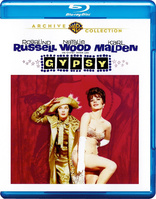
Movie rating
7.5 | / 10 |
Blu-ray rating
| Users | 4.0 | |
| Reviewer | 4.0 | |
| Overall | 4.0 |
Overview
Gypsy (1962)
The story of how determined stage mother Rose dragged her daughters, June and Louise, into show business. Louise eventually became "Gypse Rose Lee", a world-famous striptease artist, on whose autobiography this story is loosely based. Filmed adaptation of the hit Broadway musical.
Starring: Rosalind Russell, Natalie Wood, Karl Malden, Paul Wallace (I), Betty BruceDirector: Mervyn LeRoy
| Musical | 100% |
| Comedy | Insignificant |
| Biography | Insignificant |
Specifications
Video
Video codec: MPEG-4 AVC
Video resolution: 1080p
Aspect ratio: 2.41:1
Original aspect ratio: 2.35:1
Audio
English: DTS-HD Master Audio 2.0 (48kHz, 24-bit)
Subtitles
English SDH
Discs
50GB Blu-ray Disc
Single disc (1 BD)
Playback
Region free
Review
Rating summary
| Movie | 4.5 | |
| Video | 4.0 | |
| Audio | 2.5 | |
| Extras | 1.5 | |
| Overall | 4.0 |
Gypsy Blu-ray Movie Review
You Certainly Will Say "Hoo-ray!" / If You Get This Blu-ray
Reviewed by Michael Reuben December 3, 2012Gypsy, the mother of all musicals, is one of the first pair of Blu-rays released by the Warner Archive Collection (WAC), which produces limited quantities of catalog titles for which the studio does not anticipate major demand. (The other title is Deathtrap.) Gypsy's relentless lead, Mama Rose, would take a certain satisfaction in being first, but she would no doubt protest being relegated to the WAC program. In Rose's eyes, anything undertaken by her family of "theater artists" deserved top billing and star treatment. The 1959 Broadway musical by Arthur Laurents, Jule Styne and Stephen Sondheim may be based on the life of famous stripper Gypsy Rose Lee and bear her name, but it's really about her monster of a stage mother, who dragged her two daughters around the vaudeville circuit until one of them ran off and the other, Gypsy, did the worst thing you can do to a stage mother—she became successful on her own. Legendary Broadway producer David Merrick acquired the rights to Lee's autobiography, and envisioned star Ethel Merman as Rose. Laurents agreed to write the book of the musical, after he became intrigued by the theme of parents living out their lives through their children. Sondheim, who was then still known primarily as the protégé of Oscar Hammerstein, wanted to write the score, but Merman insisted on an established songwriter, Jule Styne. At Hammerstein's advice, Sondheim agreed to stay on and write the lyrics, as he had for West Side Story. Musical theater fans can only be grateful, as the lyrics for Gypsy are as witty, spare and memorable as anything in the American theater songbook. Jerome Robbins directed and choreographed, and it's a tribute to the clarity of Robbins' presentation that subsequent productions, of which there have been many, as well as the 1962 film directed by Hollywood veteran Mervyn LeRoy have drawn heavily on Robbins' original conceptions. Those who have tried to reinvent the wheel, as Sam Mendes did in a poorly received 2003 Broadway revival starring a miscast Bernadette Peters, have generally found themselves stuck in the mud. Mama Rose is one of those massive, all-consuming roles like a character from Shakespeare. It won Tony awards for Angela Lansbury, Tyne Daly and Patti LuPone, and it became the role with which Ethel Merman was most identified. Merman reportedly never forgave Rosalind Russell for taking her place in the film version. Even though Merman was LeRoy's first choice, studio politics and marketing concerns prevailed. Merman was the better (much better) singer, but Russell was better known to the public at large.
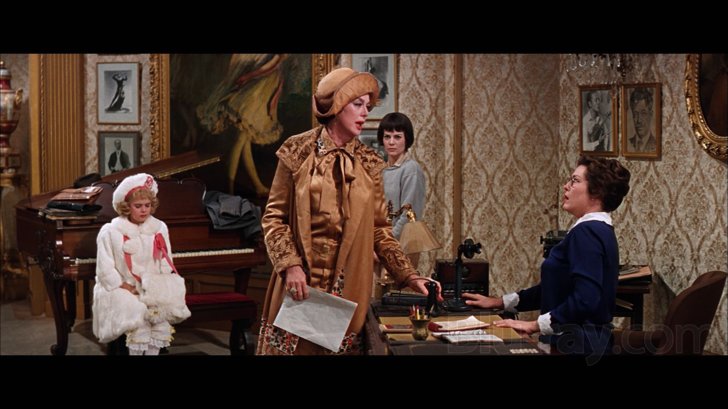
If you've read this far, you probably already know both the story and the score of Gypsy. You probably also know that it's one of the definitive musicals of the American theater. It's been called the greatest musical of all time and certainly deserves that title as much as any other contender. Except for minor plotting changes and a more upbeat tone to the ending (especially as compared to the most recent Broadway production directed by original book writer Arthur Laurents in 2008), LeRoy's film is extremely faithful to the original. Thrice-married Rose Hovick (Russell) steamrollers her way across the vaudeville circuit promoting her two daughters, the blonde and precocious Baby June (Morgan Brittany), and the brunette and clumsy Baby Louise (Diane Pace). Over the years, the girls grow up into "Dainty" June (Ann Jillian) and just plain Louise (Natalie Wood), but a running joke is that Rose barely changes the act, even as she adds a backing chorus (sometimes called "Newsboys", sometimes "Farmboys", always unpaid), plus a cow, a train and costume changes. The songs are always the same, and so are the dances. Along the way, Rose picks up a potential fourth husband in the person of Herbie (Karl Malden), the performer turned Butterfinger salesman who undertakes to manage Rose's traveling circus. Smitten by Rose's boundless energy and enthusiasm, Herbie hopes she'll settle down with him one day. Herbie is the only one who's surprised when, after years of loyal service, he finally realizes that he'll always play second fiddle to Rose's ambition. One day June flees with a chorus member, and Rose is shattered—for about two minutes. Then she decides to promote Louise to stardom, regardless of what Louise wants. To listeners who don't know the context, the famous Act I curtain number, "Everything's Coming Up Roses", may sound like a devoted pledge of support from the greatest mom in the world. In context, it's a horror show, as Rose shoves Louise, kicking and screaming, into the spotlight. But Louise has the last laugh, even if it sounds more like a cackle of madness. Booked into a burlesque house by mistake, Louise finds one night that her mother has committed her to a last-minute substitution for a stripper who's been arrested. (They need the money, and besides it's the star stripper.) Although she doesn't take off more than a glove and a shoulder strap, Louise suddenly discovers that she's pretty—and men like her this way. In no time at all, Louise transforms into a person called "Gypsy Rose Lee" (the name results from a series of accidents). She's moved into a fancy new address where there's no room for Mama. LeRoy had performed in vaudeville before switching to Hollywood in the silent era. He knew the milieu well enough to situate Rose and her brood in it believably, and he was sufficiently comfortable directing musicals that he could trust simple devices like opening the film with an orchestra playing the overture (one of the best in American musicals) while the credits materialize on a giant theatrical curtain at the top of the screen. (Baz Luhrman updated this device effectively in Moulin Rouge.) It's the cinematic equivalent for what an overture does in the theater, which is to prepare viewers for the songs to come. Watch LeRoy move his cast through a scene, and you realize that directors of his era never suffered from self-consciousness about having characters burst into song; they didn't even feel any need to change the scene, the lighting or the camera angle to mark the shift from dialogue to melody. They understood that musicals have their conventions, just like fantasy, sci-fi and comic book adaptations. If you direct your actors appropriately, it will seem perfectly natural when they start singing, especially in Gypsy. There's no character more naturally operatic than Mama Rose.
Gypsy Blu-ray Movie, Video Quality 
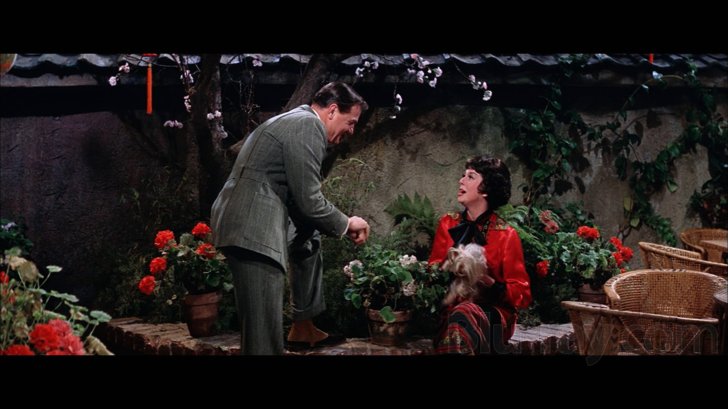
In the same recent interview in which Warner's George Feltenstein spoke of doing a new transfer for Deathtrap, he also disclosed that this 1080p, AVC-encoded Blu-ray of Gypsy is based on the HD transfer done for the 2009 DVD, but that additional work was performed to make the master suitable for Blu-ray. Whatever that work may have been, the results are impressive. Harry Stradling, Sr.'s Oscar-nominated cinematography shines with brilliant color, especially the reds and greens, and provides a crisply detailed image that holds its focus even in the numerous long shots of the wide vaudeville stages where Mama Rose's charges perform their act. In the sharply edited sequence in which Louise evolves into Gypsy Rose Lee, her multiple costumes can be appreciated in all their minute features, as can the accoutrements of success in her dressing room afterward. Blacks and shadow details are strong enough that it's easy to spot the sets and painted backdrops. (Contemporary audiences could spot them too, but in those days you played along instead of complaining that something looks "fake".) Neither detail filtering nor artificial sharpening were in evidence. Warner has used a BD-50; so compression errors were not an issue.
Gypsy Blu-ray Movie, Audio Quality 
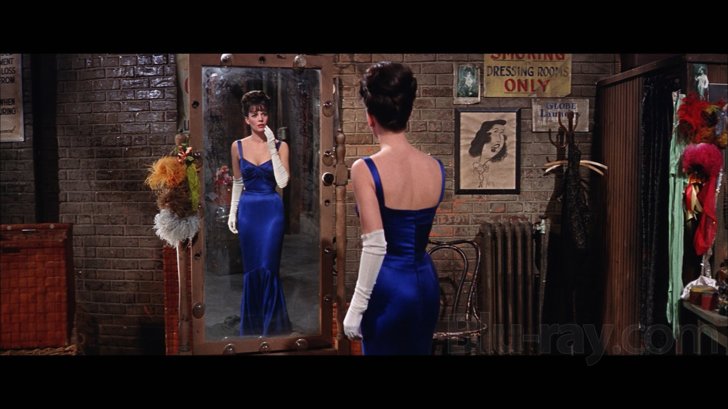
The lossless DTS-HD MA 2.0 track sounds good but not great. The voices are clear, and the lyrics are easy to understand, no doubt thanks to studio recording, which is readily apparent because the tonal quality is different from that of the dialogue (and also because Russell was dubbed for almost all her singing). Sound effects are basic with relatively little directionality other than right and left. The dynamic range for the orchestral recording is somewhat less than I had hoped, and it's unfortunate, because the music has been mixed much louder than the dialogue and effects between songs. To hear the dialogue scenes at an appropriate level, it's necessary to set your amplifier at a level where the orchestral volume threatens to become shrill and fatiguing when the songs kick in. (Here, as with all sonic issues, much will depend on one's equipment, listening space and sense of hearing.) While I would love to see a complete remix and re-eq of Gypsy from the ground up, this would require availability of the original stems, and I suspect those disappeared long ago. This mix may not be ideal, but it gets the job done, once you find the right volume level for your system, environment and personal taste.
Gypsy Blu-ray Movie, Special Features and Extras 
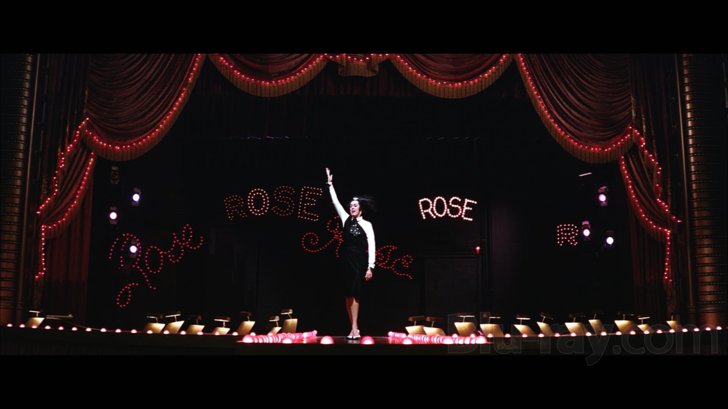
- Songs: According to IMDb, these two songs were deleted shortly after the film's initial release. Long thought lost, they were restored from an early release print provided by a private collector; hence the substantially weaker quality.
- Wherever We Go (1080p; 2.20:1; 2:39): The inherent staginess of this number, which has physical comedy routines spelled out in the lyrics, probably brought the film to a dead stop.
- You Couldn't Get Away From Me (1080p; 2.41:1 & 2.20:1; 3:37): This is the complete version of the song, including both the portion retained in the film and the part that was cut out. The change in aspect ratio as well as audio and visual quality clearly mark the edit.
- Trailer (1080p; 2.41:1; 3:36): The trailer focuses heavily on Natalie Wood and the character of Gypsy Rose Lee. Of course, like Gypsy's dances, it's mostly a tease.
Gypsy Blu-ray Movie, Overall Score and Recommendation 
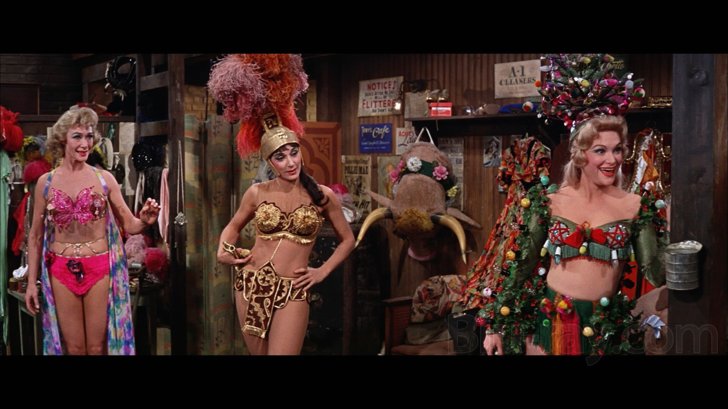
One of the most commonly abused drugs in America doesn't come as a powder or pill but in intangible form. It's the yearning for fame, and today the desire is daily stoked on dozens of cable channels and everywhere on the internet. Over half a century ago, the creators of Gypsy etched an indelible portrait of the corrosive effects of a lifelong addiction, especially when the desired fame never arrives. The concluding song of Gypsy, "Rose's Turn", is a tour de force of bitterness, as Rose contemplates the star she could have been (or so she imagines). The scene can be moving, infuriating, horrifying, grotesque—indeed, all of the above at once when played by a great actress like Russell. In Ethel Merman's hands (and lungs) before a live audience, it must have been electrifying. Later generations of fans who can't make it to one of the better revivals can now at least experience LeRoy's faithful translation to the screen courtesy of WAC's fine Blu-ray. Highly recommended.
Similar titles
Similar titles you might also like

Road to Bali
1952

Victor/Victoria: The Broadway Musical
1995

Thank Your Lucky Stars
Warner Archive Collection
1943

Bye Bye Birdie
1963

Les Girls
Warner Archive Collection
1957

Du Barry Was a Lady
Warner Archive Collection
1943

Anchors Aweigh
1945

Camp
2003

Deep In My Heart
Warner Archive Collection
1954

Ziegfeld Follies
Warner Archive Collection
1945

Hans Christian Andersen
Warner Archive Collection
1952

Thoroughly Modern Millie
1967

Company
Stephen Sondheim's Company
2007

Clambake
1967

Robin and the 7 Hoods
1964

Mame
1974

Evita
15th Anniversary Edition
1996

Broadway Melody of 1940
Warner Archive Collection
1940

Damn Yankees
Warner Archive Collection
1958

The Slipper and the Rose: The Story of Cinderella
1976